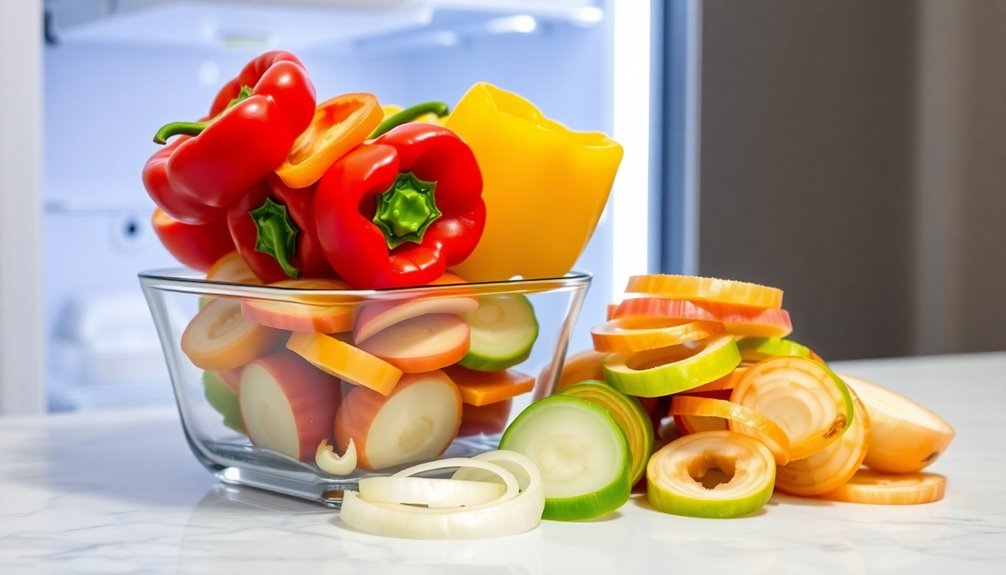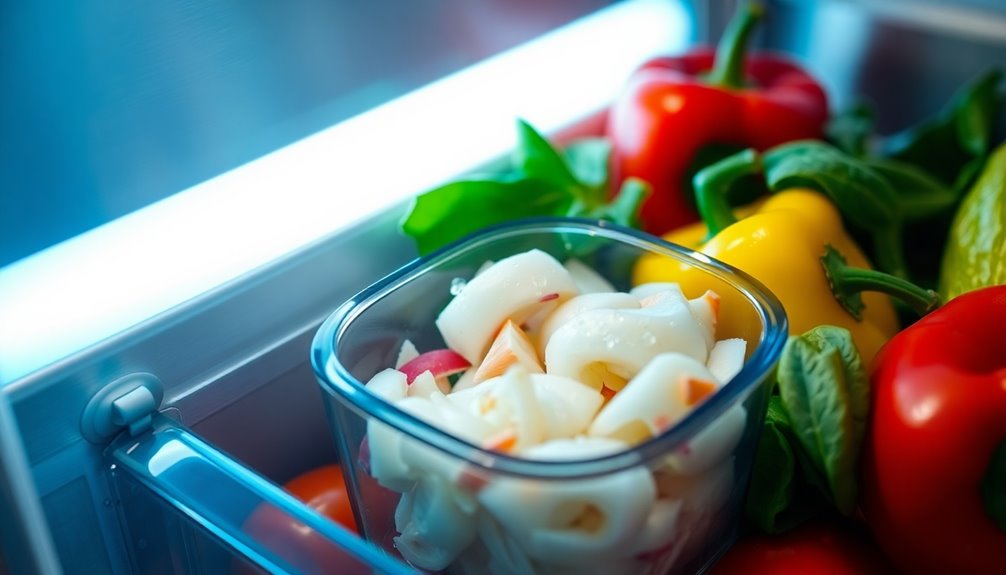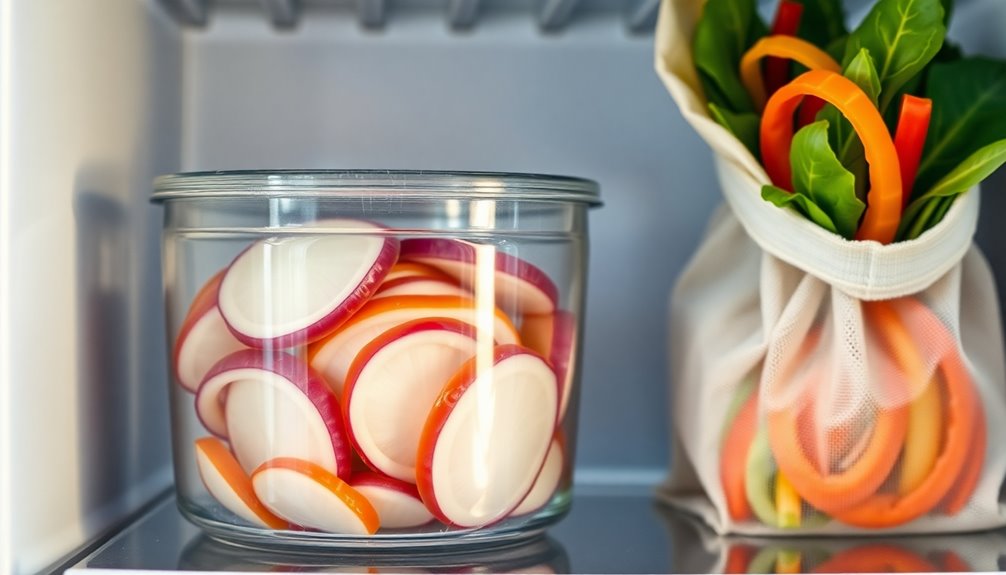To store cut onions and other veggies frugally in your fridge, wrap onions tightly in plastic wrap or place them in an airtight container to keep them fresh for up to 7-10 days. For leafy greens, use a plastic bag with a paper towel to absorb moisture. Bell peppers do well in a plastic bag in the crisper drawer, while root veggies should be kept in a cool, dry spot. Regularly check for freshness and safety, discarding any spoiled produce. Want to maximize freshness and reduce waste further? There's more helpful advice ahead!
Best Practices for Cut Onions
When you've got leftover cut onions, proper storage is key to keeping them fresh and safe. Start by wrapping the cut onions tightly in plastic wrap or placing them in an airtight container. This prevents moisture loss and stops those pungent odors from transferring to other foods in your fridge. Additionally, using budgeting tools can help you allocate funds for fresh produce, minimizing waste and encouraging responsible shopping habits. Budget apps can also assist in tracking how much you spend on onions and other vegetables, ensuring you stay within your budget.
Stored like this, your onions can last up to two weeks, but always inspect them before use. Look for any color changes, unusual smells, or mold—if you notice any of these signs, remember the golden rule: when in doubt, toss it out.
It's important to note that once onions are cut, they shouldn't be consumed raw after storage due to safety concerns. If you want to store them for a longer period, consider chopping and freezing them in an airtight container or freezer bags; they can last for several months this way. Additionally, using effective storage techniques can help you reduce waste and keep your kitchen organized.
Just a tip: avoid washing your onions before storing, as excess moisture can lead to quicker spoilage and decay. By following these best practices, you can make the most of your cut onions and reduce waste in your kitchen.
Storing Leafy Greens Effectively
To keep your leafy greens fresh and crisp, it's crucial to store them properly right after purchase. Start by sorting through your greens and discarding any mushy leaves; this prevents spoilage from spreading.
Tender salad greens should be consumed quickly, so store them unwashed in a plastic bag with a paper towel to absorb excess moisture. Make sure to keep these greens away from ethylene-producing fruits, which can hasten deterioration. Additionally, supporting companies that prioritize environmental sustainability can enhance your impact while shopping for groceries.
For hardier greens like kale and collards, wrap them in paper towels and place them in a resealable bag. They can last 1-2 weeks in the fridge, and if you plan to freeze them, consider blanching first for better flavor and texture retention.
If you're dealing with brassicas like Brussels sprouts and cabbage, keep them in plastic bags in the fridge as well. Brussels sprouts will stay fresh for 1-2 weeks, while whole heads of cabbage can last 2-3 weeks without washing. Additionally, supporting eco-friendly stores can enhance sustainability efforts while you shop for your groceries.
Tips for Storing Bell Peppers

Tips for Storing Bell Peppers
Bell peppers can add vibrant color and flavor to your meals, but proper storage is key to keeping them fresh. Here are three essential tips to make certain your bell peppers stay delicious:
- Store in the crisper drawer: Keep your bell peppers in a plastic bag within the crisper drawer of your fridge. This method helps maintain their freshness for up to two weeks and can lead to increased savings when buying fresh produce. Utilizing AI-driven tools for shopping can further enhance your experience by helping you find the best deals on fresh ingredients.
- Freeze for longer storage: If you want to store bell peppers for an extended period, wash, seed, and slice them. Lay the pieces flat on a baking sheet to freeze, then transfer them to a freezer bag. They'll keep well for up to six months.
- Avoid ethylene producers: Make certain to keep bell peppers away from ethylene-producing fruits like apples and bananas. This prevents premature spoilage.
Regularly inspect your stored bell peppers for signs of softness or discoloration and use them promptly to avoid waste. Additionally, you can enhance your savings by utilizing coupon codes when purchasing fresh produce, ensuring you get the best value for your groceries.
You can also consider preserving them by macerating in citrus juice or vinegar for a tasty addition to your dishes.
Following these tips will guarantee you enjoy your bell peppers at their best!
Managing Root Vegetable Storage
Storing root vegetables like carrots, parsnips, turnips, and beets requires some attention to detail, but it's worth it for their longevity. You can keep these veggies fresh for up to three months by storing them in a cool, dry place at temperatures between 40-50°F. Additionally, using expense tracking tools can help manage costs associated with purchasing and storing fresh produce. A smart budgeting approach can also enhance your overall financial management.
Avoid using plastic bags, as they trap moisture and can lead to spoilage. Instead, opt for paper bags, which allow for better air circulation and help prevent decay.
Check your root vegetables regularly for any signs of rot, and be sure to keep them separate from ethylene-producing fruits like apples and bananas, which can shorten their shelf life.
Potatoes should also be stored in a dark, cool environment to prevent sprouting and maintain their freshness. Additionally, using breathable containers can enhance air circulation, minimizing moisture buildup and ensuring your root vegetables stay crispy and delicious for as long as possible.
For ideal storage, consider using breathable containers that promote air circulation. This minimizes moisture buildup, ensuring your root vegetables stay crispy and delicious for as long as possible.
Safety Tips for Stored Produce

Regular inspections of your stored produce are essential for maintaining safety and freshness. Over time, even well-stored veggies can develop issues that might compromise their quality. Here are three key tips to keep in mind:
- Check for Color Changes: Inspect your onions and other vegetables for any discoloration. If you notice significant changes, it's best to discard them.
- Watch for Unusual Odors: Trust your nose! If you detect any strange smells coming from your stored produce, it could indicate spoilage or bacterial growth. Don't hesitate to throw it out. Implementing automated reminders for timely usage of stored produce can also enhance freshness.
- Look for Mold or Decay: Regularly check for visible signs of mold or decay. If you spot any, it's a clear sign that the produce shouldn't be consumed.
Properly wrapped cut onions can last up to a couple of weeks in the fridge. Additionally, consider implementing a centralized system for tracking bills to help manage expenses related to purchasing fresh produce more efficiently.
However, always prioritize freshness by using your senses—sight, smell, and touch—when evaluating safety.
And remember, when in doubt, toss it out! Keeping these tips in mind will help guarantee that you enjoy your veggies safely and deliciously.
Conclusion
Storing cut veggies doesn't have to be a hassle. Think of your fridge as a cozy little home for your produce, where each item deserves its own space. Just like you wouldn't cram a couch into a closet, give your onions and greens room to breathe. I once tossed a wilted salad because I forgot about it in the back; now, I treat my veggies like guests, ensuring they're fresh and ready to shine when I need them!



